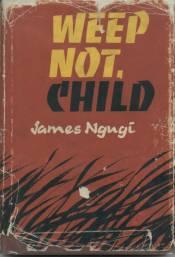Weep Not, Child

First British edition
|
|
| Author | Ngũgĩ wa Thiong'o |
|---|---|
| Country | Kenya |
| Language | English |
| Genre | Historical novel |
| Publisher | Heinemann |
|
Publication date
|
1964 |
| Media type | Print (Hardback & Paperback) |
| Pages | 144 |
| ISBN | |
| Preceded by | The Black Hermit (play) |
| Followed by | The River Between |
Weep Not, Child is Kenyan author Ngũgĩ wa Thiong'o's first novel, published in 1964 under the name James Ngugi. It was the first English novel to be published by an East African. Thiong'o's works deal with the relationship between Africans and the British colonists in Africa, and are heavily critical of British colonial rule. Specifically, Weep Not, Child deals with the Mau Mau Uprising, and "the bewildering dispossession of an entire people from their ancestral land." Ngũgĩ wrote the novel while he was a student at Makerere University.
The book is divided into two parts and eighteen chapters. Part one deals mostly with the education of Njoroge, while part two deals with the rising revolutionary, anti-colonist turmoil in Kenya.
Njoroge, a young boy, is urged to attend school by his mother. He is the first one of his family able to go to school. His family lives on the land of Jacobo, an African made rich by his dealings with white settlers, namely Mr. Howlands, the most powerful land owner in the area. Njoroge's brother Kamau works as an apprentice to a carpenter, while Boro, the eldest living son, is troubled by his experiences while in forced service during World War II, including witnessing the death of his elder brother. Ngotho, Njoroge's father and a respected man in the surrounding area, tends Mr. Howlands' crops, but is motivated by his passion to preserve his ancestral land, rather than for any compensation or loyalty.
One day, black workers call for a strike to obtain higher wages. Ngotho is ambivalent about participating in the strike because he fears he will lose his job. However, he decides to go to the gathering, even though his two wives do not agree. At the demonstration, there are calls for higher wages. Suddenly, the white police inspector brings Jacobo to the gathering to pacify the native people. Jacobo tries to end to the strike. Ngotho attacks Jacobo, and the result is a riot where two people are killed. Jacobo survives and swears revenge. Ngotho loses his job and Njoroge’s family is forced to move. Njoroge’s brothers fund his education and seem to lose respect for their father.
...
Wikipedia
